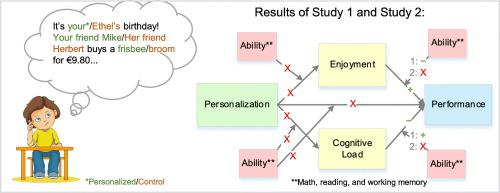Learning and Individual Differences ( IF 3.897 ) Pub Date : 2021-03-19 , DOI: 10.1016/j.lindif.2021.101982 Eva Van de Weijer-Bergsma , Sanne H.G. Van der Ven

|
In two context personalization studies, we examined (a) enjoyment and cognitive load as two potential mechanisms explaining the effects of context personalization on mathematical word problem performance, and (b) whether individual differences in math, reading and working memory ability moderated these effects. In both studies (Study 1: N = 238; Study 2: N = 149) primary school students from 6th grade completed math word problems in either a personalized condition or a control condition. Students rated their enjoyment and experienced cognitive load after each problem. Moderated mediation models showed that while ability, enjoyment and cognitive load significantly predicted performance, (a) personalization did not affect word problem performance, enjoyment or cognitive load, and (b) the three different abilities did not moderate these relations. The findings are discussed in light of three personalization principles (depth, grain size, ownership) and complexity in different steps of math problem solving.
中文翻译:

为什么个性化数学问题以及对谁提高性能?测试不同能力水平下的享乐和认知负荷的中介
在两项情境个性化研究中,我们研究了(a)享乐和认知负荷是解释情境个性化对数学单词问题表现影响的两个潜在机制,以及(b)数学,阅读和工作记忆能力的个体差异是否缓解了这些影响。在两项研究中(研究1:N = 238;研究2:N = 149)六年级的小学生在个性化条件或控制条件下完成了数学单词问题。学生对每个问题的满意度和经历的认知负荷进行评估。适度的调解模型显示,虽然能力,享受和认知负荷显着预测了表现,但(a)个性化不影响单词问题的表现,享受或认知负荷,并且(b)三种不同的能力并未调节这些关系。将根据三种个性化原则(深度,粒度,所有权)和在解决数学问题的不同步骤中的复杂性来讨论研究结果。



























 京公网安备 11010802027423号
京公网安备 11010802027423号